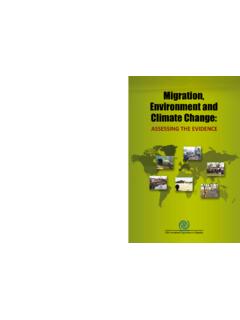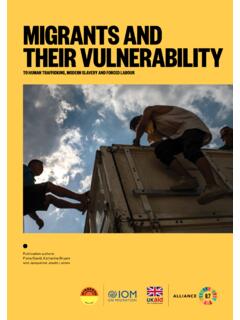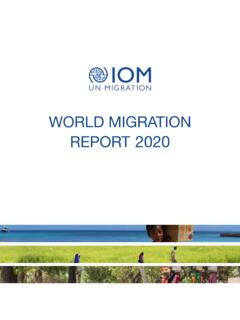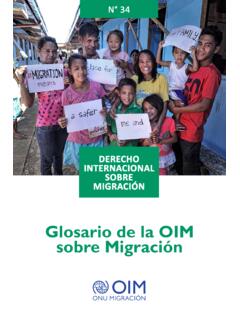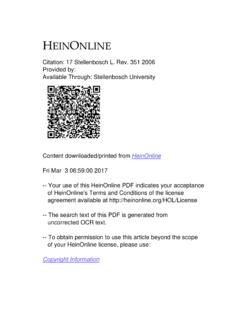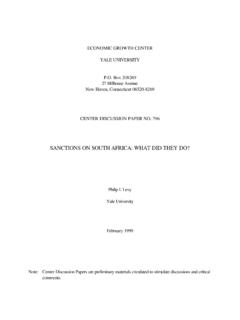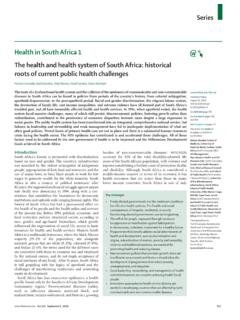Transcription of The Human Rights of Migrants - IOM Online Bookstore
1 United NationsThe Human Rights of MigrantsIOMUNThe Human Rights of MigrantsInternational migration is at an all-time high. However, government officials,policy makers, NGO advocates, academic researchers and internationalagencies have only recently begun to consider the Human Rights dimensionof migration. Under the Universal Declaration of Human Rights , signed over 50 yearsago, Human Rights are universal, indivisible, and inalienable; in other words, Human Rights for all . However, their de facto extension to many vulnerablegroups, such as Migrants , has been a long and difficult process, by nomeans complete.
2 This collection of articles also published as a special issue of IOM'sInternational Migrationjournal has been compiled to promote furtherdebate and research on the issues of migration and Human Rights . Thisbook includes a discussion of the challenges in the next decade for therecognition and extension of the Human Rights of Migrants ; a summary ofapplicable international Human Rights instruments; a review of her work bythe UN Special Rapporteur on the Human Rights of Migrants ; an analysisof the special Human Rights situation of internally displaced persons (IDPs);and an examination of the Human Rights abuses in south africa , the hostcountry of the World Conference Against Racism, Racial Discrimination,Xenophobia and Related Intolerance in September 2001.
3 The book con-cludes with an annotated bibliography on Migrants Human IOM publicationsThe Role of Regional Consultative Processes in Managing InternationalMigration published 2001 World Migration Report 2000 published 2000 Migrant Trafficking and Human Smuggling in Europe: A Review of the Evidence with Case Studies from Hungary, Poland and Ukraine published 2000 Return Migration: Journey of Hope or Despair? published 2000 Perspectives on Trafficking of Migrants published 2000 HumanRights 6/15/01 4:43 PM Page 1 Document1 06/12/02 16:00 Page 1 The Human Rightsof MigrantsOffprint ofInternational Migration Vol.
4 38 (6) Special Issue 3/2000 Editor: Reginald AppleyardCopublished by:International Organization for Migration (IOM)United NationsUnited Nations2 Author's nameIOM is committed to the principle that humane and orderly migration benefits migrantsand society. As an intergovernmental body, IOM acts with its partners in theinternational community to: assist in meeting the operational challenges of migration;advance understanding of migration issues; encourage social and economic develop-ment through migration; and uphold the Human dignity and well-being of Organization for Migration17 route des Morillons1211 Geneva 19 SwitzerlandTel: + 91 11 Fax: + 61 50E-mail: expressed in the study are those of the authors and do not necessarily reflectthe views of the International Organization for Migration or the United Rights reserved.
5 No part of this publication may be reproduced, stored in a retrievalsystem, or transmitted in any form or by any means, electronic, mechanical, photo-copying, recording, or otherwise, without the prior written permission of by the International Organization for Migration and the United Nations. International Organization for Migration and the United Nations, 2001 ISBN-92-9068-098-9 (International Organization for Migration)United Nations PublicationSales Number: Human Rights of MigrantsTABLE OF CONTENTSI ntroduction3 Human Rights of Migrants : Challenges of the New DecadePatrick A.
6 Taran7 Protection of Migrants Human Rights : Principles and PracticeHeikki S. Mattila53 The Role of the United Nations Special Rapporteuron the Human Rights of MigrantsGabriela Rodriguez73 Principles of Protection for Internally Displaced PersonsErin D. Mooney81 The Dark Side of Democracy: Migration, Xenophobiaand Human Rights in south AfricaJonathan Crush103 Bibliography135 IntroductionDuring the next decade, migration is likely to be a cutting-edge issue ininternational relations, economics and social order in many countries. Indeed,during the last few years news items on the impacts of migration have alreadymoved from the back pages to the front pages of news media , remittances, the impact of Migrants on employment and the spreadof HIV/AIDS and crime, and polemic debates on multiculturalism, are nowwidely covered in policy debates, political speeches and negotiations, localtown hall meetings and international , until quite recently, the treatment of individuals as Migrants .
7 Immigrantsand refugees had been little more than a footnote to many policy debates,governmental consultations and academic reviews. Perhaps only in the luridnews reports of deaths of Migrants in trafficking, and migrant workers treatedbrutally in fields and sweatshops, was the painful dimension of commonplacedenial of the Rights and dignity of Migrants made discourse of international Human Rights has finally extended to migrantsand migration. Rather quickly, government officials, policy-makers, NGOadvocates, academic researchers and international agencies have begun toconsider the Human Rights dimension of contemporary the Universal Declaration of Human Rights (created fifty years ago), Human Rights are universal (they apply everywhere), indivisible (political andcivil Rights cannot be separated from social and cultural Rights ); and inalienable(they cannot be denied to any Human beings).
8 However, their de facto extensionto many vulnerable groups has been a long and difficult process, by no meanscomplete. Migrants and indigenous persons, in particular, experience strongresistance to recognition of their Human 1990 Convention on the Protection of the Rights of All Migrant Workers andMembers of their Families was a major step forward in identifying and attemptingto protect the Human Rights of Migrants . The Convention viewed Migrants notsimply as labourers or economic entities but as social entities, with families;recognized that by being non-nationals they were not always protected by thenational legislation of receiving states; emphasized that all migrant workers,including the undocumented, have fundamental Rights ; called for an end to illegal4 Introductionand clandestine movements.
9 And the establishment of minimum standards ofprotection for migrant workers and members of their 1997, a Working Group of Experts was appointed by the UN Human RightsCommission to identify obstacles to the effective Human Rights of Migrants andto provide recommendations for their resolution. As Heikki Mattila shows, theWorking Group confirmed that Migrants still suffer from relative powerlessnessand need to be empowered through the strengthening of their Rights . To thisend, the Group called for more effort to speed up ratification of the 1990 Convention which had not come into force because only 16 of the requiredminimum 20 countries had acceded to the Convention.
10 All the States Party tothe Convention were primarily countries of origin of Taran argues that this very slow progress, coupled with explicitdisinterest in the instrument, symbolize a broader general resistance to recogni-tion of the application of Human Rights standards to Migrants , particularlyundocumented Migrants . He concurs with Cholewinski s view that provisionsexplicitly granting Rights to illegal Migrants are likely to hinder ratification bymany countries, even though being rendered outside the applicability andprotection of the law is contrary to the inalienability of Human Rights illegalization of Migrants has led to tendencies to associate Migrants andmigrations with crime and criminality, unemployment, disease and other socialills.


